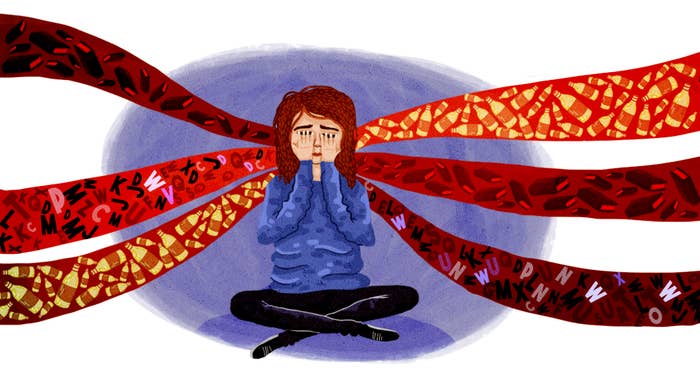
"You can tell me if something's wrong." (Aged 7-12)
I've written before about what it was like growing up with an alcoholic parent. It was, in short, pretty shit in many ways. I had other stuff going on, too. All throughout primary school I was bullied, for all the usual crimes (I was short, I was clever, I was poor). The school's way of dealing with it was to call me into the headmaster's office, with my bullies, to shake hands and promise to be friends. Surprisingly, that didn't work.
Children and teens carry around invisible pressures – at school, they may not know what's going on at home, and at home, there might be too much going on to talk about what's happening at school. Someone, somewhere, asking, "Are you OK?" might have opened up that pressure valve and let some of it out, before it exploded – which it did.
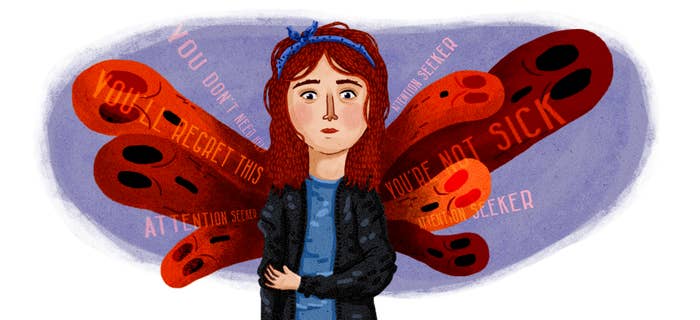
"I don't judge you." (Aged 12)
I started self-harming when I was 12. I had read what I now realise was a spectacularly ill-advised magazine article on it. It featured glossy images of photogenic women talking about how self-harm had helped them cope with their feelings. At least, as an impressionable child who was desperate to find a way to cope, that's how I read it.
I didn't know there was much of a taboo around self-harm – after all, it was in magazines, and someone in my favourite band had done it. After my first experiments, I wore a T-shirt. People, out of fear and shock, went mad at me. But it didn't stop me from doing it; I just became better at hiding it, and my self-harm became more extreme. I was afraid of being judged, and when I tried to get help for it, I was. I was basically told that I was attention-seeking, with nobody ever asking what I was seeking attention for.
I ended up not getting medical help when I needed it because I was afraid of what would they would say, and I was afraid they'd tell my parents, who would think the same thing about me.
Not everybody judged me, but those I tried to ask for help did, and it meant I didn't ask any more. Self-harming is my biggest regret. I didn't really understand that I'd still have scars 20 years later. I haven't self-harmed in eight years, but still I wear my teenage pain on my adult body.
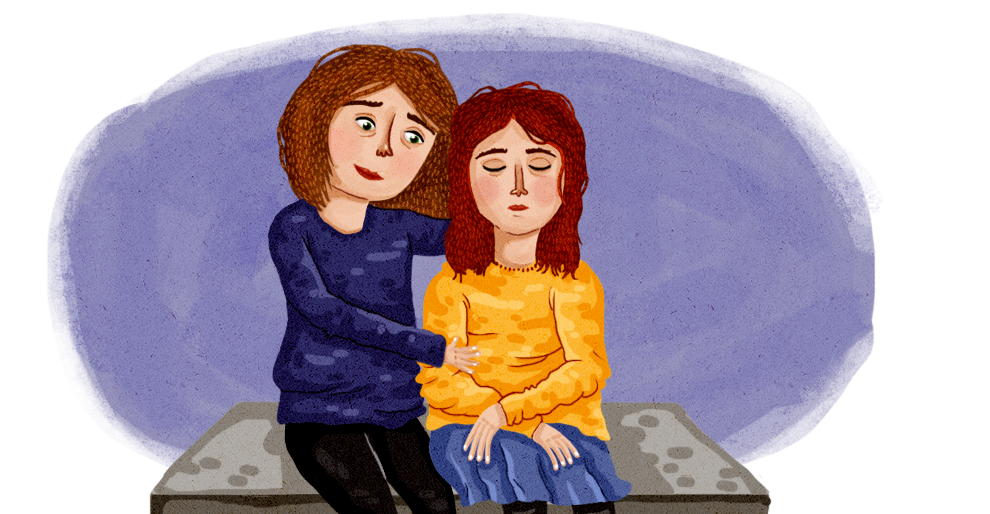
"You don't have to be nice for people to care." (Aged 14-17)
I had friends, who liked that I was funny, sarcastic, and sweary. I was still, alas, short. But I wasn't "nice". My moods swung dramatically – storms that raged in my head and drowned me. Then I was quieter, withdrawn, pale, unwashed, asleep.
Then I would reappear as a tsunami. Rearing up, roaring, destructive. I held people hostage with talk, talk, talk, I was often confused, I lied, I could be impulsive, irritable, unpredictable. Some of the time is in vignettes – wandering streets laughing, my mum crushing sleeping pills into food to help me to eat and sleep when I barely did either, writing incessantly. Everybody thought I was on drugs, but I'd mostly bypassed that phase of experimentation.
It was frightening. I didn't understand what was happening to me and I didn't feel like I had control over it. It was badly affecting my education, and my family were at their wits' end with me. Because I could feel so dramatically different – from blank to invincible – I was treated differently.
I felt like I wasn't even the "right" kind of mental to be cared about. I wasn't pretty nor "quiet" either. I wasn't even weird in a kind of acceptable way. I wasn't "troubled", I was trouble. And no one likes trouble.
But I was aware, from seeing things my friends were going through, that being "nice" could be equally tough. Because when you're nice, when you're quiet, and when you feel you have to be nice and quiet, who will notice when you're struggling?
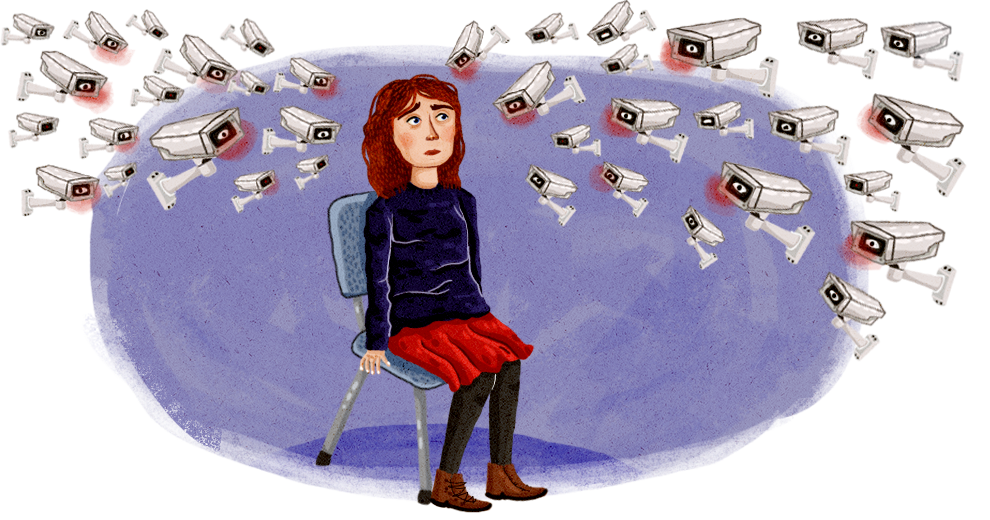
"We might not have the answers, but we want to help." (Aged 15)
It's hard to separate, even now, what was me being a normal teenager – albeit a bit of a highly strung one who read pretentious novels and wore too much eyeliner – and what was being mentally unwell. Teenagers have mood swings, our personalities are forming, and teenagehood is a time of flux – everything, from your brain to your body to your social life to family, is changing. It's right to test identities, and it's normal to feel unsure and lost. I was looking for an anchor – I'm not sure what. Not a reason, not even an explanation, but someone who believed me and validated what I was feeling and who could help me to cope with it.
I was referred to child and adolescent mental health services after my teachers (funny, helpful, insightful, feminist teachers I admired) wrote concerned (and, when I read them years later, somewhat hilarious) letters about me when my friend died and I had my heart broken by my first love. I went to fortnightly appointments with a counsellor in a bleak hospital with corridors that couldn't have been created with children in mind – because that's what I was, and what all of us who were there were.
After that I was referred to a doctor, and by that point I was pretty desperate for help. I remember that it was very early in the morning. When I arrived, everything was dark and empty and I noticed that there were CCTV cameras. I thought I was being filmed, and that they were keeping me waiting in darkness to test me, and that they were watching me. At the end of rambling (I don't remember anything I said), I waited for her to tell me something, to say what we should do, or what would happen next. She said, "You're an intelligent girl – you swear too much." She prescribed me some pills without explaining what they were for, and when I took them, I felt so drunk and sleepy I fell down the stairs into the dog.
Years later, I paid a tenner to read my own medical records, mostly through my fingers, which I almost bit off in sheer embarrassment at my teenage shenanigans. The doctor had written that I was "cynical and evasive". Fifteen!
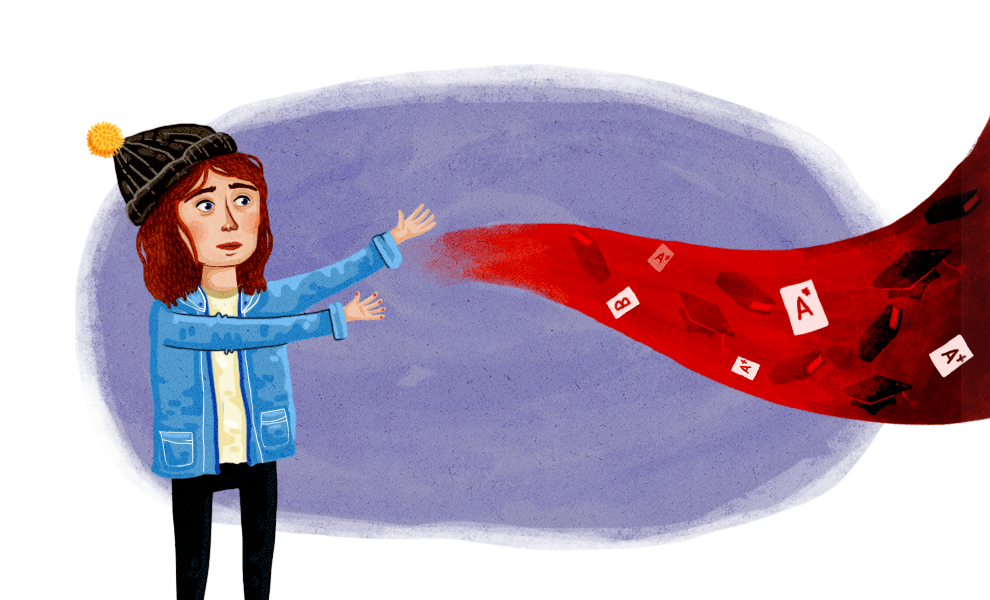
"This isn’t the end of your life." (Aged 17)
My mental health eventually knocked me out of school for almost a year, and I only managed seven GCSEs. I wanted to put being a "cynical, evasive, attention-seeking, troublesome teen" behind me, so I went to college to do my A-levels, which turned out to be a huge mistake.
I can barely remember that period of time and I was kicked out of college because "mental health is more important than education right now". And that was that. My education, and all the hopes I had had for it, was over.
My parents were pretty pissed, and everyone else disappointed. I felt like my life was over. So I made a very mature decision – I borrowed money for a taxi to the airport and a flight from my mum and I ran off to London to live with a boyfriend. My parents, who had been pretty battered by the previous years, let me, reasoning (probably correctly) that I would run away if they didn't.
In London, I tried to go back to college but dropped out. It was too soon – I was in a strange place and I only knew one other person, who was having to support me so much I was worried about breaking them. I didn't know how to begin to return from the wilderness, the storm-battered lands. I saw more doctors, who gave me more pills, which made me fat and sleep so much I struggled to hold down a job.
I felt like I had had one shot at my life and that I had blown it. I felt like my life was over before it had even begun. But it wasn't.
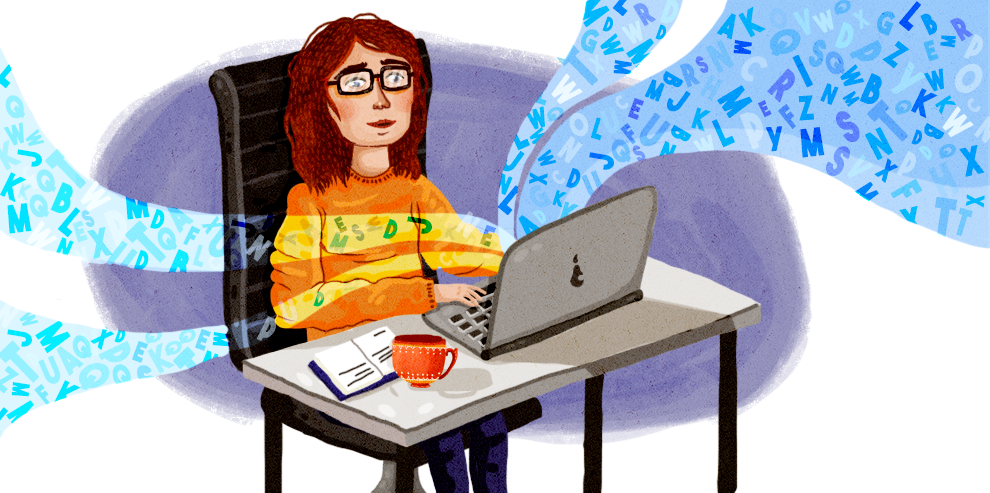
"Forgive yourself." (Aged 18)
When I was 21, I ended up in a psychiatric hospital, where I was diagnosed with bipolar disorder.
Learning how to live with it was a path I was going to hobble down rather than sprint. But I had some crutches. My mental health team applied for, and got, some funding for me to take a night course at college. I got a qualification – it wasn't one I had ever imagined getting – but it meant everything to me, the beginning of saying goodbye to the end. I got a job. I continued writing and started blogging. I talked to people who'd been there too, and for every horror story I had, they had one of their own. I still took medication and had bad periods, but my mental health is just part of my life and my landscape. I didn't walk into the sunset without a backward glance – I'm still walking.
As the distance between me and my past began to increase, I started to see things more clearly. I see a child who wasn't coping with what was happening – whether that was mental illness, life in general, or a mixture of both. I try to take responsibility for the things I can control and forgive myself for the things I couldn't. There are people who I thought would remember when I acted bizarrely, but they barely flicker an eyelid at me, and those who do remember just shrug. My family, whom I worried about the most, mostly take the piss out of me about what was once so painful. And they still love me.
That was then. This is now. Though didn't leave everything from the past behind – I married the boy who first broke my heart.
